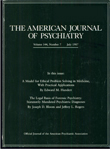Self-Reported Anxiety, General Medical Conditions, and Disability Bed Days
Abstract
OBJECTIVE: This study examined the effect of self-reported anxiety on the number of days persons with various general medical conditions spend in bed owing to disability. METHOD: Self-reported medical illness and disability data from a nationally representative household survey sample (N=20,884) were analyzed. RESULTS: Among respondents with general medical conditions, those with self-reported anxiety had a nearly fourfold greater length of disability (mean=18.0 bed days) than the nonanxious respondents (mean=4.8 bed days). After adjustment for differences in demographic characteristics and burden of general medical illness, anxiety was associated with an additional 3.8 bed days. CONCLUSIONS: Self-reported anxiety in combination with general medical conditions may be associated with extensive functional impairment. (Am J Psychiatry 1997; 154:1766–1768)



